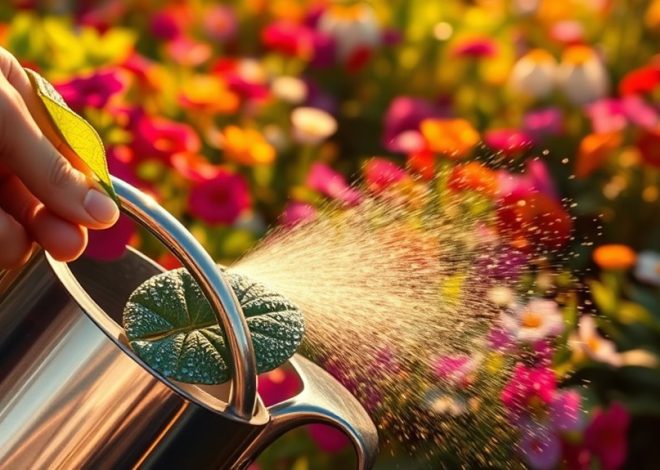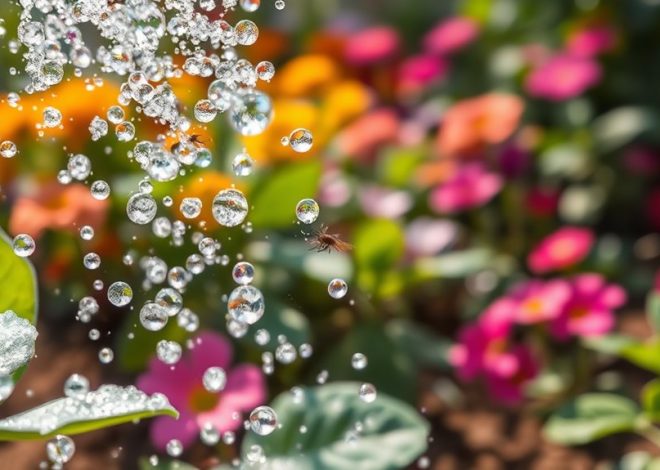
How I Keep Pests Out of My Garden Naturally
How I Keep Pests Out of My Garden Naturally
You’d think keeping pests out of your garden is an impossible mission. But with the right strategies, you can naturally safeguard your plants without harsh chemicals. From companion planting to homemade sprays, there are numerous effective methods to explore. You’ll also want to consider attracting beneficial insects and maintaining healthy soil. Let’s uncover the practical steps that can transform your garden into a thriving, pest-free oasis.
Key Takeaways
- Utilize companion planting by pairing marigolds with vegetables and basil with tomatoes to naturally deter pests.
- Apply homemade pest repellents like garlic or chili pepper sprays to keep unwanted insects away.
- Attract beneficial insects such as ladybugs and lacewings to control pest populations effectively.
- Implement physical barriers like row covers and garden netting to protect plants from pests and birds.
- Maintain soil health through composting and crop rotation, which disrupts pest cycles and enhances plant resilience.
Companion Planting Strategies
Companion planting is a powerful strategy that can enhance your garden’s health while naturally deterring pests.
By pairing certain plants together, you can create a harmonious environment where beneficial insects thrive and harmful pests are repelled.
For instance, planting marigolds alongside vegetables can deter nematodes, while basil can ward off aphids when planted near tomatoes.
Additionally, intercropping can confuse pests, making it harder for them to locate their preferred hosts.
Remember to research compatible plant combinations for optimal results. Certain pairings can also enhance growth, flavor, and pest resistance, providing multiple benefits for your garden.
Implementing these natural pest control methods not only protects your plants but also promotes biodiversity in your garden, leading to a healthier ecosystem overall.
Homemade Pest Repellents
In addition to companion planting, homemade pest repellents offer an effective way to keep unwanted critters at bay.
You can create a simple garlic spray by blending garlic cloves with water, straining, and adding a few drops of dish soap. This mixture deters aphids and spider mites. Garlic pest spray is a natural alternative that is not only eco-friendly but also safe for your garden.
Another option is a chili pepper spray, made by mixing crushed red pepper with water and allowing it to steep overnight.
For a more aromatic solution, mix essential oils like peppermint or lavender with water in a spray bottle.
Apply these repellents regularly to ensure they’re effective against pests in your garden.
Beneficial Insects to Attract
Creating a thriving garden ecosystem means attracting beneficial insects that naturally control pest populations. Here are four key insects to invite into your garden:
- Ladybugs: They feast on aphids and other soft-bodied pests, keeping their numbers in check.
- Lacewings: Their larvae are voracious predators of aphids, caterpillars, and thrips.
- Parasitic Wasps: These tiny wasps lay eggs in pest larvae, effectively reducing their populations.
- Hoverflies: Their larvae consume aphids, while adults pollinate flowers, benefiting your plants. Additionally, introducing a top pollinator plant can significantly enhance the presence of these beneficial insects, further improving your garden’s health and resilience.
Physical Barriers and Traps
Implementing physical barriers and traps is a highly effective strategy for keeping pests at bay in your garden. Use row covers to shield plants from insects and netting to protect your fruits. You can also place traps for slugs and snails, ensuring they don’t munch on your greens. Here’s a quick reference for some useful options:
| Barrier/Trap | Purpose | Tips |
|---|---|---|
| Row Covers | Protects seedlings from insects | Ensure they’re secured against wind |
| Garden Netting | Shields fruits from birds | Choose fine mesh for small pests |
| Sticky Traps | Catches flying insects | Place near affected plants |
| Slug Traps | Attracts and traps slugs | Use beer or soapy water as bait |
In addition to these methods, creating a natural garden pest barrier can enhance your protection against unwanted invaders.
Maintaining Soil Health
To keep pests at bay, maintaining healthy soil is crucial for your garden’s success.
By composting, you can create a nutrient-rich environment that supports plant growth and resilience against pests. Additionally, practicing crop rotation helps disrupt pest life cycles and promotes soil diversity, making your garden less attractive to unwanted invaders. Incorporating organic amendments into your soil further enhances its fertility and structure, contributing to a thriving ecosystem.
Composting for Nutrient Balance
A healthy garden thrives on balanced nutrients, and composting serves as a vital tool for achieving this equilibrium.
By creating your own compost, you enrich your soil naturally.
Here are four key benefits of composting for nutrient balance:
- Improves Soil Structure: Compost enhances aeration and drainage, promoting healthy root growth.
- Nutrient-Rich: It provides essential nutrients like nitrogen, phosphorus, and potassium, vital for plant development.
- Microbial Activity: Compost boosts beneficial microorganisms, aiding in nutrient absorption.
- Reduces Waste: Composting diverts kitchen scraps and yard waste from landfills, making it an eco-friendly practice.
Start composting today for a thriving garden!
Crop Rotation Benefits
Crop rotation offers numerous benefits that can significantly enhance soil health in your garden.
By alternating the types of crops you plant, you can prevent nutrient depletion, as different plants require varying nutrients.
This practice also disrupts pest and disease cycles, reducing infestations without chemicals.
For instance, legumes enrich the soil with nitrogen, benefiting subsequent crops.
Additionally, rotating crops improves soil structure and enhances microbial diversity, promoting healthier roots.
To implement this, create a plan that rotates families of plants each season, ensuring your garden thrives while naturally minimizing pests and diseases.
You’ll enjoy healthier plants and a more bountiful harvest!
Regular Garden Maintenance
Regular garden maintenance is essential for keeping pests at bay and promoting healthy plant growth.
By consistently weeding, using proper watering techniques, and implementing a crop rotation strategy, you can create a balanced ecosystem that discourages unwanted insects. Additionally, incorporating essential habits such as companion planting can further enhance your garden’s resilience against pests.
Staying proactive with these practices helps ensure your garden thrives while minimizing pest problems.
Consistent Weeding Practices
While it might be tempting to let weeding slide until the garden looks overrun, consistent weeding practices are essential for maintaining a healthy growing environment.
Weeds compete for nutrients, water, and sunlight, which can weaken your plants.
To keep your garden thriving, follow these tips:
- Weed regularly: Aim to weed once a week, especially after rain.
- Use mulch: Apply a 2-3 inch layer to suppress weed growth.
- Pull weeds early: Catch them when they’re small to prevent them from spreading.
- Be mindful of roots: Ensure you remove the entire root to stop regrowth.
Proper Watering Techniques
How can you ensure your plants get the right amount of water without overdoing it?
Start by checking the soil moisture regularly.
Stick your finger about an inch into the soil; if it feels dry, it’s time to water.
Early morning is the best time to water, as it reduces evaporation and allows plants to absorb moisture throughout the day.
Aim for deep, infrequent watering rather than light, frequent sessions, encouraging root growth.
Use a soaker hose or drip irrigation for efficiency.
Lastly, consider mulching to retain moisture and regulate soil temperature, helping your plants thrive naturally.
Crop Rotation Strategy
Maintaining proper watering techniques sets the foundation for healthy plants, but managing soil health through crop rotation can further enhance your garden’s resilience against pests.
By rotating your crops, you disrupt pest life cycles and improve soil nutrients.
Here’s how to implement a successful crop rotation strategy:
- Group plants by families to rotate effectively.
- Plan your rotation to avoid planting the same family in the same spot for at least three years.
- Monitor soil health and adjust your rotation based on nutrient needs.
- Include cover crops during off-seasons to enrich the soil.
Start rotating today for a thriving garden!
Using Essential Oils for Pest Control
Essential oils offer a natural and effective method for keeping pests out of your garden.
You can create a simple spray by mixing 10-15 drops of essential oil, like peppermint or lavender, with water in a spray bottle. Shake well before each use.
Target areas where you spot pests, applying it in the early morning or late evening to avoid harming beneficial insects.
Alternatively, you can soak cotton balls in essential oils and place them around your plants.
This not only deters pests but also adds a pleasant aroma to your garden.
Regular applications will keep your plants safe and thriving.



